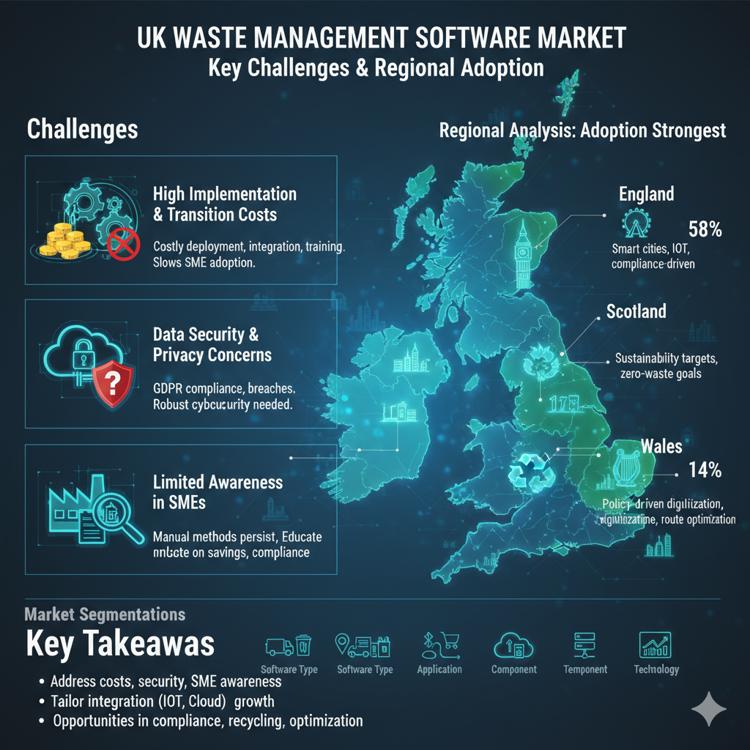Is the UK Ready for a Digital Waste Revolution? Inside the $1.23 Billion Waste Management Software Market?

The United Kingdom is on the cusp of a transformative shift in waste management, driven by digital innovation. With the UK Waste Management Software Market projected to grow from $600.05 million in 2024 to $1.23 billion by 2032, at a CAGR of 9.38%, the question arises: Is the UK ready for a digital waste revolution? This article delves into the factors propelling this growth, the key players involved, and the implications for municipalities and enterprises across the nation.
The Digital Transformation of Waste Management
Historically, waste management in the UK relied heavily on manual processes and traditional methods. However, the increasing complexity of waste streams, stricter environmental regulations, and the push towards sustainability have necessitated a shift towards digital solutions. Waste management software now offers capabilities such as route optimization, real-time tracking, compliance monitoring, and data analytics, enabling more efficient and transparent operations.
Market Growth and Projections
The UK Waste Management Software Market has experienced significant growth, from $452.49 million in 2018 to $600.05 million in 2024. This upward trajectory is expected to continue, with projections indicating a rise to $1.23 billion by 2032. This growth is driven by several factors:
- Regulatory Compliance: Stricter environmental regulations require accurate reporting and adherence to standards, which digital solutions facilitate.
- Operational Efficiency: Automation and optimization features reduce costs and improve service delivery.
- Sustainability Goals: Tools for tracking recycling rates and waste diversion support the UK's sustainability objectives.
Key Players in the Market
Several companies are at the forefront of this digital revolution in waste management:
- Wastebits: Offers cloud-based solutions for waste tracking and analytics.
- Whitespace Work Software: Provides mobile-first platforms for field operations and back-office management.
- Waste Logics Software Limited: Delivers end-to-end automation for waste collection and recycling processes.
- ISB Global: Specializes in integrated waste and recycling management solutions.
- Midsoft: Known for products like SkipTrak and BinRound, focusing on route optimization and fleet management.
- Terinea (WasteMetrix): Offers tools for waste auditing and compliance reporting.
- Bartec Municipal Technologies: Provides solutions for fleet management and service optimization.
- Quick Consign: Specializes in waste tracking and reporting for the construction industry.
- Fissara: Offers mobile workforce management solutions for waste service providers.
These companies are leveraging technologies such as IoT, AI, and cloud computing to enhance waste management operations.
Regional Adoption and Infrastructure
England leads the adoption of waste management software, holding a 58% market share in 2024. This dominance is attributed to advanced municipal infrastructure, smart city initiatives, and significant government investments in digital waste management systems. Other regions, including Scotland, Wales, and Northern Ireland, are also adopting digital solutions, albeit at a slower pace.
Challenges and Considerations
Despite the promising growth, several challenges need to be addressed:
- Integration with Legacy Systems: Many municipalities still operate on outdated systems, making integration with new software complex.
- Data Security and Privacy: Ensuring compliance with data protection regulations, such as GDPR, is crucial.
- Cost of Implementation: Initial investment and training can be barriers for smaller enterprises.
- Resistance to Change: Cultural and organizational resistance can impede the adoption of new technologies.
Future Outlook
The future of waste management in the UK is poised for further digital integration. Emerging technologies like AI for predictive analytics, blockchain for waste tracking, and advanced robotics for sorting are expected to play significant roles. Additionally, the emphasis on a circular economy will drive the need for more sophisticated waste management solutions.
Driving Innovation: Key Growth Drivers in the UK Waste Management Software Market
The United Kingdom's waste management sector is undergoing a significant transformation, propelled by advancements in technology and a strong commitment to sustainability. Central to this evolution is the adoption of digital waste management software, which is reshaping how municipalities and enterprises handle waste. This article delves into the primary growth drivers of the UK Waste Management Software Market, highlighting the factors that are fueling its expansion.
1. Rising Government Regulations and Compliance Needs
The UK government has implemented stringent regulations to promote recycling, reduce emissions, and minimize landfill usage. Compliance with the EU Waste Framework Directive and national sustainability targets has become imperative for municipalities and enterprises. Digital waste management platforms facilitate accurate reporting, real-time tracking, and automation of documentation processes, ensuring adherence to these evolving environmental standards.
For example, Enevo UK has partnered with local councils to deploy sensor-based waste management software. This collaboration aids in optimizing collection efficiency and provides actionable insights to improve overall waste operations
2. Increasing Adoption of Cloud-Based Platforms
Cloud-based waste management solutions are gaining prominence due to their scalability, cost-effectiveness, and ease of integration. These platforms enable mobile access, real-time updates, and IoT connectivity, making them ideal for modern waste management needs. Subscription-based models offered by vendors reduce upfront costs, making these solutions accessible to a broader range of organizations.
Evreka, a leading provider in this space, launched its cloud-based Smart Waste Management Platform in the UK. This platform facilitates real-time monitoring and route optimization through IoT sensor integration, enhancing operational efficiency
3. Expansion of Circular Economy Practices
The UK's emphasis on circular economy practices is driving the demand for software that supports recycling, reuse, and resource optimization. Digital platforms enable enterprises and municipalities to track recyclable materials, optimize collection routes, and measure sustainability metrics. This shift not only enhances operational efficiency but also strengthens corporate social responsibility initiatives.
The collaboration between TerraCycle and Evreka exemplifies this trend. Together, they developed a waste management technology that utilizes real-time data to support circular economy objectives
4. Integration of IoT and Smart Technologies
The integration of Internet of Things (IoT) devices and smart sensors is revolutionizing waste management practices. These technologies enable real-time waste tracking, automated route optimization, and predictive maintenance of collection vehicles. By connecting with RFID and GPS-enabled systems, waste management becomes more efficient and responsive.
Tata Consultancy Services (TCS) utilized IoT-driven solutions for PostNord, enhancing sorter capacity, streamlining collection processes, and improving distribution plans. This initiative demonstrates the potential of IoT in optimizing waste management operations
5. Growing Focus on Data-Driven Sustainability Reporting
There is an increasing demand for transparency in sustainability practices, with investors, regulators, and consumers seeking detailed data on waste handling and carbon impact. Waste management software equipped with advanced analytics and customizable reporting tools enables organizations to generate comprehensive sustainability and Environmental, Social, and Governance (ESG) reports.
KEY ESG software provides NHS providers with tools to manage clinical waste more effectively, centralizing ESG data while ensuring legal compliance with hazardous waste regulations. This approach improves transparency and operational efficiency in the healthcare sector

Key Challenges Facing the UK Waste Management Software Market
1. High Implementation and Transition Costs
o Initial deployment of waste management software involves substantial costs.
o Integration with legacy systems, staff training, and customization add further expenses.
o Smaller councils and enterprises often struggle to afford sophisticated platforms, slowing adoption despite long-term operational savings.
2. Data Security and Privacy Concerns
o Cloud-based solutions dominate, but sensitive operational data raises GDPR compliance concerns.
o Municipalities and enterprises fear data breaches and unauthorized access.
o Vendors must invest in robust cybersecurity and encryption frameworks to build trust among clients.
3. Limited Awareness in Small and Medium Enterprises (SMEs)
o Many SMEs in the UK still rely on manual tracking methods.
o Lack of awareness limits adoption beyond large municipalities and corporations.
o Educating SMEs on cost savings, compliance advantages, and sustainability benefits is crucial to unlock market potential.
Regional Analysis: Where Adoption is Strongest
1. England (58% Market Share in 2024)
· Leads the market due to strong municipal infrastructure and early adoption of digital platforms.
· Smart city initiatives in London, Birmingham, and Manchester support IoT-enabled waste tracking and recycling.
· Municipal authorities invest heavily in compliance-driven solutions to achieve landfill reduction goals.
· Retail and healthcare sectors leverage cloud-based modules for efficient reporting.
2. Scotland (17% Market Share in 2024)
· Adoption driven by national sustainability targets and strict recycling mandates.
· Councils use software for waste hauling and tracking to meet zero-waste goals.
· Investments in cloud-based platforms improve service delivery across urban and rural areas.
· Manufacturing enterprises deploy solutions for compliance and resource optimization.
3. Wales (14% Market Share in 2024)
· Strong policy-driven adoption of municipal digitalization and recycling initiatives.
· Local authorities prioritize waste tracking and route management software for operational efficiency.
· Healthcare regulations drive adoption of biomedical waste management modules.
· Vendor partnerships expand system coverage across urban and semi-urban regions.
4. Northern Ireland (11% Market Share in 2024)
· Gradual adoption of both cloud-based and on-premise solutions.
· Municipal organizations rely on software for compliance and operational reporting.
· Growth driven by industrial and retail sectors requiring transparent waste auditing.
· Route management and recycling software gain traction, with smaller councils adopting scaled solutions.
Market Segmentations
By Software Type
· Waste Hauling Software
· Waste Tracking Software
· Route Management Software
· Scale Software
· Recycling Software
· Maintenance Software
· Others
By Application
· Municipal
· Retail
· Manufacturing
· Healthcare
· Others
By Component
· Cloud-Based Software
· On-Premise Software
By Technology
· Bluetooth
· Real-Time Locating System (RTLS)
· Radio Frequency Identification (RFID)
· Wi-Fi
· Others
By Region
· England
· Scotland
· Wales
· Northern Ireland
Key Takeaways
· Challenges like high costs, data security concerns, and low SME awareness must be addressed to expand adoption.
· Regional differences highlight the importance of tailoring solutions to municipal infrastructure, policy frameworks, and industry requirements.
· Technological integration, including IoT, cloud platforms, and smart sensors, continues to be a major growth driver.
· Market segments across software types, applications, and technology present ample opportunities for vendors specializing in compliance, recycling, and operational optimization.

1. Which Companies Are Driving the UK Waste Management Software Market?
The market is highly competitive, blending domestic providers and international vendors. Key players include:
- Wastebits – Specializes in comprehensive waste management modules, including hauling, tracking, and reporting.
- Whitespace Work Software – Focuses on mobile-first platforms for field operations and compliance management.
- Waste Logics Software Limited – Offers end-to-end solutions for municipal and enterprise clients.
- ISB Global – Provides integrated platforms emphasizing recycling and regulatory compliance.
- Midsoft – Known for route optimization and fleet management solutions.
- Terinea (WasteMetrix) – Specializes in reporting platforms for operational efficiency.
- Bartec Municipal Technologies – Targets large-scale municipal systems with cloud and on-premise deployment.
- Fissara and Quick Consign – Focus on flexible, cloud-based, mobile-first adoption models for smaller operations and enterprises.
Question to ponder: How do these players differentiate themselves in an increasingly crowded market?
2. How Are Technology Innovations Shaping Competition?
Advancements in IoT, RFID, GPS, and data analytics are transforming the way waste is collected, tracked, and reported:
- IoT Integration – Sensors on bins and collection vehicles provide real-time monitoring and predictive insights.
- RFID Technology – Enables automated tracking and reporting for compliance purposes.
- Data Analytics – Offers actionable insights to improve operational efficiency and reduce environmental impact.
Example: Municipalities leveraging IoT-enabled route optimization can reduce fuel consumption and emissions while improving collection schedules.
Question to ponder: Will technology innovation become the defining factor for market leadership?
3. Are Strategic Partnerships a Key Competitive Advantage?
Vendors are increasingly partnering with local councils and private enterprises to expand adoption. These collaborations allow companies to:
- Accelerate implementation of cloud-based platforms.
- Integrate regulatory compliance modules with municipal systems.
- Provide tailored solutions for SMEs and large organizations alike.
Example: Partnerships with councils enable vendors to showcase ROI through efficiency gains, compliance adherence, and sustainability reporting.
Question to ponder: Can strategic alliances create long-term dominance in a moderately concentrated market?
4. How Are Vendors Addressing Sustainability Demands?
Rising environmental regulations and consumer awareness are driving demand for digital waste management solutions:
- Companies provide modules for recycling tracking, landfill diversion, and ESG reporting.
- Cloud and mobile-first solutions support smart city initiatives, enabling municipalities to meet sustainability targets.
- Vendors leverage analytics to optimize waste collection and promote circular economy practices.
Question to ponder: Are sustainability features now a necessity rather than a differentiator in the UK market?
5. What Challenges Shape the Competitive Environment?
Even with technological advances and partnerships, vendors face significant challenges:
- Moderate market concentration – A few leading firms dominate, but mid-sized vendors can capture niche segments.
- Integration with legacy municipal systems – Legacy software and manual processes can slow adoption.
- Cost and scalability concerns – Smaller municipalities may struggle with initial investment, despite long-term benefits.
- Compliance and cybersecurity – Ensuring GDPR compliance and data security remains a critical factor for market trust.
Question to ponder: How will vendors balance innovation with affordability and compliance requirements?
6. What’s the Future of Competition in the UK Waste Management Software Market?
Looking ahead, market growth will likely be defined by:
- Increased adoption of cloud-based and mobile-first platforms.
- Broader integration of IoT and AI technologies.
- Expansion into SMEs and non-municipal enterprises.
- Enhanced data-driven sustainability reporting, catering to ESG-focused stakeholders.
Question to ponder: Will the next market leaders be those who innovate technologically, expand strategically, or combine both to capture a wider audience?

Conclusion
The UK Waste Management Software Market is poised for significant growth, projected to expand from USD 600.05 million in 2024 to USD 1,229.68 million by 2032, reflecting a compound annual growth rate (CAGR) of 9.38%. This growth is driven by a combination of stringent government regulations, increasing adoption of cloud-based platforms, and a shift towards circular economy practices. Municipalities and enterprises are increasingly turning to digital solutions to improve efficiency, reduce costs, and meet sustainability targets. Key players in the market are leveraging advancements in IoT, RFID, and data analytics to enhance operational efficiency and regulatory compliance. Strategic partnerships with local councils and private enterprises are further accelerating adoption, while addressing challenges such as high implementation costs and data security concerns. As the market continues to evolve, vendors that can navigate these challenges and capitalize on emerging trends will be well-positioned for success in the UK's dynamic waste management landscape.
Source: https://www.credenceresearch.com/report/uk-waste-management-software-market
- Business
- Research
- Energy
- Art
- Causes
- Tech
- Crafts
- crypto
- Dance
- Drinks
- Film
- Fitness
- Food
- الألعاب
- Gardening
- Health
- الرئيسية
- Literature
- Music
- Networking
- أخرى
- Party
- Religion
- Shopping
- Sports
- Theater
- Wellness


